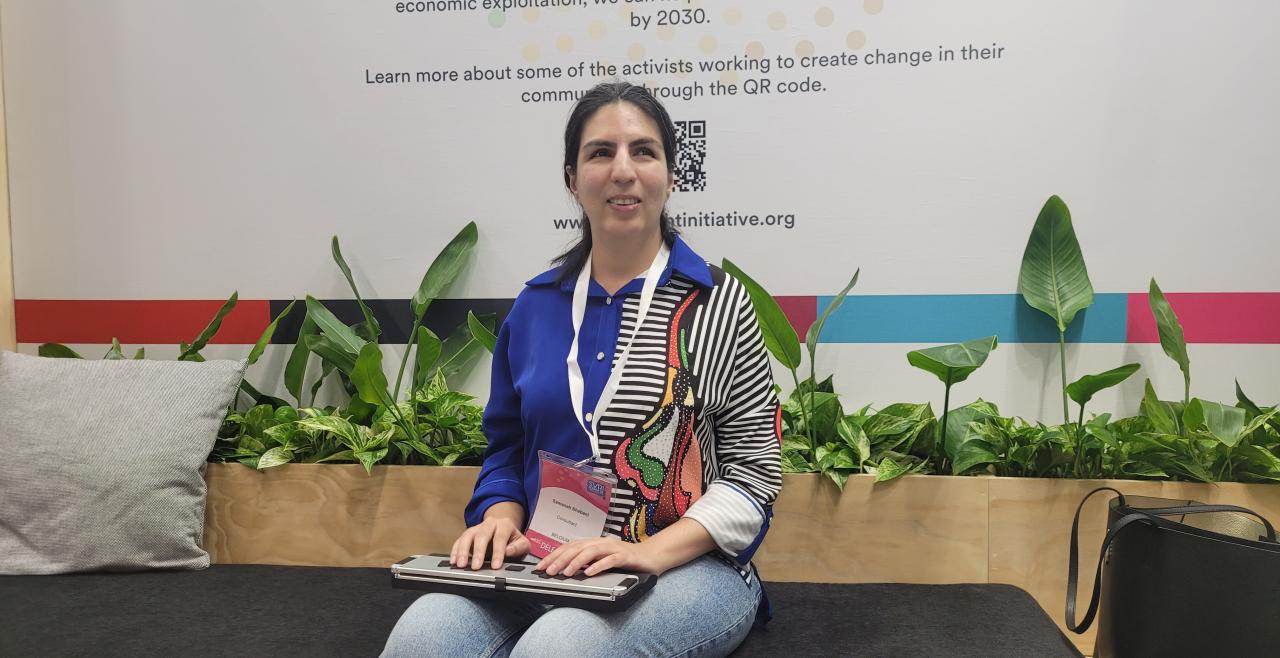"We need many voices" - Why disability inclusion is essential to eliminating gender-based violence

Samaneh Shabani is an advocate for women's rights and disability inclusion. She has worked in policy development and as a legal consultant with organizations such as the United Nations Development Programme and European Disability Forum. Ms. Shabani focuses on the intersection of gender and disability, particularly addressing violence against women with disabilities. She is a member of the Spotlight Initiative Civil Society Global Reference Group.
"I hope that we can put these academic works into action and translate them into policies that help women and girls with disabilities live free from violence." - Samaneh Shabani, Advocate
Why is preventing violence against women and girls important to you?
I started this work when I was doing my PhD. I grew up as the youngest in a family of four children – I have three brothers – and I always lived with lots of love and support as a girl with a disability. When I grew up, I suddenly understood the efforts behind my development as a person, all the efforts that my parents put in to support me. Some of my peers were not in a stable situation and did not receive the same kind of support and were left behind as a result.
I also considered the situation of women and girls with disabilities in my country, Iran, and I said ‘yes, I should do something [about this]’. I started my research [as] there was a lack of resources in this field in my country. I know the process is slow, but I hope that we can put some of these academic works into action and translate them into policies that help women and girls with disabilities live free from violence, with love and peace.
What do you hope to achieve with the Spotlight Initiative Civil Society Global Reference Group?
I have always worked with organizations for people with disabilities, in civil society or with the UN in related programmes. Last year, I felt it was time to step forward and join the mainstream activities of women’s rights and be the voice of the community of people with disabilities. I want to work with all women, from all over the world, and I can speak on behalf of my society, the people I know well.
"We live in a world where women and girls with disabilities experience at least two to five times more violence." - Ms. Shabani
What are some policy or advocacy outcomes that you would like to see?
It’s so amazing to be at SVRI (the Sexual Violence Research Initiative), seeing advocates working with their hearts to bring peace to the lives of women all over the world. I would love to see more focus on intersectionality and leaving no one behind. I see some, but it’s not enough. We live in a world where women and girls with disabilities experience at least two to five times more violence [than women without disabilities]. I’m talking about 500 to 600 million people, all over the world. We need many voices and I don’t hear that, we’re missing that. I hope in the future we see more and more.
Is there anything you’d like to add?
I talked about women with disabilities, but I would love to talk about women in my home country of Iran. Three years ago, we had the Woman, Life, Freedom movement. Because of that, many women are still in jail deprived of education and work. This is so saddening. Even if you have the nicest partner, nicest husband, nicest father at home, women still face a situation of domestic violence. I would like to send a message of solidarity to all women in Iran and Afghanistan. We speak the same language, we have lots of things in common culturally, and we are suffering a lot. I hope one day it will come to an end and that we can have the same concerns as [many] other women around the world. Violence for us is much higher, it’s a big barrier. It’s not limited to our home, that’s the thing.
As told to Lesira Gerdes. Interview has been edited for length and clarity.
